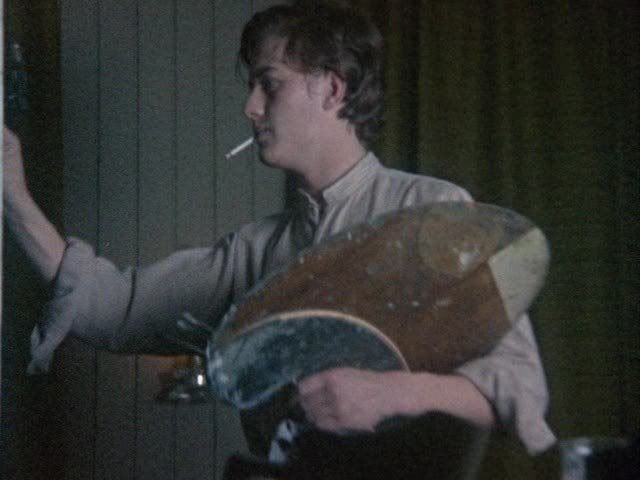
Despite its title, Peter Watkins' Edvard Munch is more than just a biographical film about the painter of the famous Scream. Munch's tortured life story, from his sickly childhood to his adult affair with a married woman, figure prominently in this fragmentary, elliptical masterpiece, but these dramas are far from the film's only subject. For one thing, the film is one of the best chronicles of the art of painting that has ever been committed to celluloid. Has there ever been a film that engages more thoroughly or more analytically with the physicality and texture of paint on canvas? Watkins lovingly pans across the surfaces of Munch's paintings, lingering on the scratched-out areas and dense layers of overpainting that indicate Munch's obsessive, often violent process of creation. This recursive creativity, with Munch revisiting the same canvases over the course of many months and compulsively worrying at their details, is mirrored in the film's aesthetics. The chronology is frequently disrupted by scenes that recur over and over again, primal scenes from Munch's youth or the short-lived affair that haunted his entire life. As the film goes on, its linear narrative is increasingly complicated by such diversions and the continual looping back that gives equal emphasis to all times at once.
Watkins injects further variety into the narrative through the use of faux-documentary techniques, as a narrator provides commentary on Munch's life, surroundings, and painting process. Most importantly for a political filmmaker like Watkins, the film also makes every effort to position Munch in the broader context of the social and political upheavals of his time. One of Watkins' theses is that Munch was an artist tragically ahead of his time, reflecting a more unfettered, emotionally honest, and deeply personal artistic expression, as though he belonged to a much freer era than the one he was born into. As such, the film frequently diverts from Munch's story in order to document problems of social class, women's rights, and sexual oppression and repression. The film is a revolutionary form of biography that resolutely refuses to limit itself to a simple chronological accounting of events. Not only does Watkins shatter chronology in order to communicate emotional truths rather than dry objective facts, but the film expands beyond the immediate details of Munch's life to explore his social context and the ways in which creativity is shaped by political realities.














8 comments:
I'm happy to see this is one of the film's you love.
Watkins is amazing and that is all there is to it. I think they have the extended version of this (which is apparently even better) on Region 2 DVD...maybe I'll buy it for myself for holidays. Great choice.
I've only seen the shorter version, which, for whatever it's worth, is the version that Watkins himself says he prefers. But both versions are out on DVD from Project X/New Yorker in Region 1 (see the Amazon links above). I'd like to check out the extended cut eventually, especially since they're reportedly completely different -- Watkins rethought and redesigned the structure to make the theatrical cut.
"Has there ever been a film that engages more thoroughly or more analytically with the physicality and texture of paint on canvas?"
How true your statement is Ed. This is a brilliant work that I was stunned by when I saw it back in 1976. Watkins does a wonderful job of juxtaposing Munch's personal torment against his public persona. And like you say this is one of the best studies on film on the art of painting. Excellent review as usual.
Thanks, John. It really is an overwhelming film, perhaps because its structure keeps driving home its powerful images, returning to the same scenes again and again. And as a study of the process of painting, the only film I can think of that even comes close (among non-documentaries, at least) is probably Rivette's Belle noiseuse.
Ed - great piece here! You are spot on, especially when you describe the film as "overwhelming" in you follow-up comment. I had to watch it in two parts, with a night in between to "recover". I still don't think I fully diggested the film. --DHS
Peter Watkins is the most important filmmaker of the second half of the twentieth century.
In this film, and throughout his work, Watkins not only challenges the viewer but also other filmmakers to escape the restrictions of accepted cinematic processes:
http://bit.ly/bGLvVj
Good call! As a longtime fan of Munch, I Netflixed this one last year and was surprised to have stumbled across a Great Film. It doesn't seem to be mentioned in that context often, but should be. The film's spell is enhanced by Watkins' use of characters looking at the viewer for seconds at a time, drawing us in as with a painted portrait. Hope you've had the chance to see the extended version by now!
Post a Comment